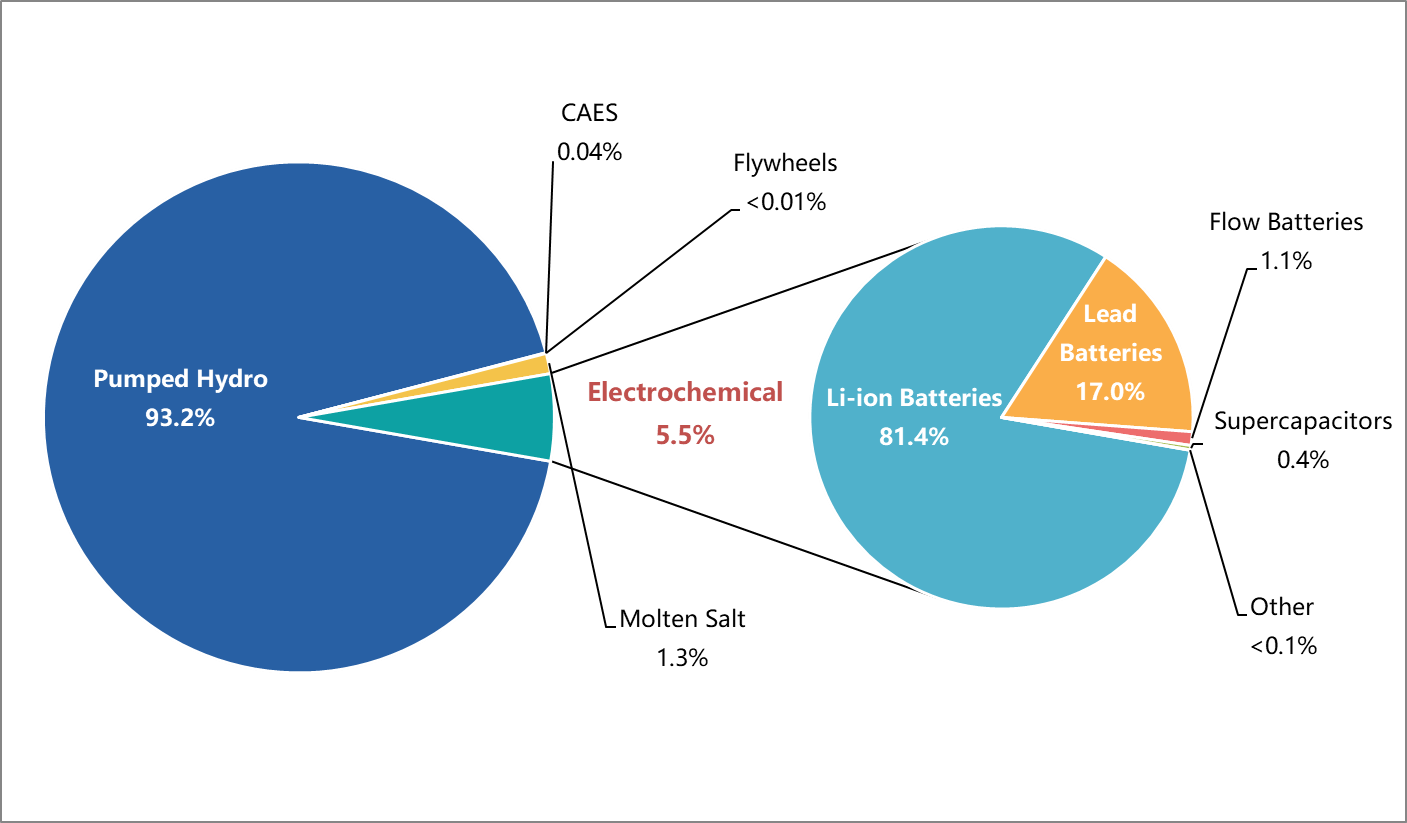1. Market Size
As of the end of March 2020 (2020.Q1), global operational energy storage project capacity (including physical, electrochemical, and molten salt thermal energy storage) totaled 184.7GW, a growth of 1.9% in comparison to 2019.Q1. China’s operational energy storage project capacity totaled 32.5GW, a growth of 3.8% compared to 2019.Q1. Global operational electrochemical energy storage capacity totaled 9660.8MW, of which China’s operational electrochemical energy storage capacity comprised 1784.1MW.
In the first quarter of 2020, global new operational electrochemical energy storage project capacity totaled 140.3MW, a growth of -31.1% compared to the first quarter of 2019. Of this new capacity, China’s new operational electrochemical energy storage capacity totaled 74.5MW, a growth of 47.5% compared to the first quarter of 2019. Global new electrochemical energy storage projects either planned or under construction totaled 2.4GW of capacity, of which China’s planned/under construction projects totaled 609.5MW of capacity. Both globally and in China, the majority of these planned/under construction projects are being developed for grid integration of centralized renewable energy, at 40.9% and 76.4% of the total planned/under construction applications, respectively.
Graph 1: global total operational energy storage project capacity (MW)
Graph 2: China’s total operational energy storage project capacity (MW)
2. Market Developments
In the first quarter of 2020, the COVID-19 epidemic spread throughout the globe, not only threatening the health and safety of those around the world, but also affecting global industries. Some that were hit particularly hard include the restaurant, entertainment, travel, and exhibition industries. In the short term, energy storage has been affected by delays or cancellations in production, project commissioning and delivery, business discussions, and international market development. For some small- and medium-sized companies, the effects of the epidemic have brought great operating pressure.
In the global market, the outbreak of COVID-19 and the various control measures implemented by different countries have stimulated enthusiasm for installing solar-plus-storage systems that can provide flexible and self-generated electricity. Although the epidemic threatens the supply chain and has caused project delays, governments are still taking active measures to promote the application and development of solar-plus-storage. For example, the governments of California and Australia have listed solar PV combined with energy storage as a basic service for residents. In the domestic Chinese market, both the results of CNESA surveys and the government’s resolve to provide economic stimulus to support epidemic recovery indicate that the impact of the epidemic on 2020’s overall energy storage market is likely to be limited. The energy storage market should continue to grow steadily, and market growth is likely to be higher than that of 2019. In the first quarter of 2020, domestic front-of-the-meter projects (including renewable integration, frequency regulation ancillary services, and grid-side projects) saw continued growth, with three new projects put into operation, including a 30MW/108MWh energy storage project at Jinjiang Anhai Park, a 15MW/7.5MWh energy storage frequency regulation project at the Hengyun power plant, and an 18MW/9MWh energy storage frequency regulation project at the Heyuan power plant. These three projects accounted for 84.6% of the total scale of new operational projects in the first quarter. In addition, new front-of-the-meter projects either planned or under construction totaled 525.8MW, accounting for 86.3% of new planned/under construction project capacity in the first quarter.
3. About this Report
CNESA Research customers can access the full version of the CNESA Global Energy Storage Market Analysis – 2020.Q1 by visiting the ESResearch website.
The ES Research website launched in January 2018 to provide an online platform for CNESA research products and services. Products and services include the Global Energy Storage Database, Energy Storage Industry Tracking, energy storage industry research reports, and research consultation services. To learn more, please visit www.esresearch.com.cn. For questions or comments, please contact the CNESA research department at the email or phone number below.
Phone: 010-65667068
Email: esresearch@cnesa.org


